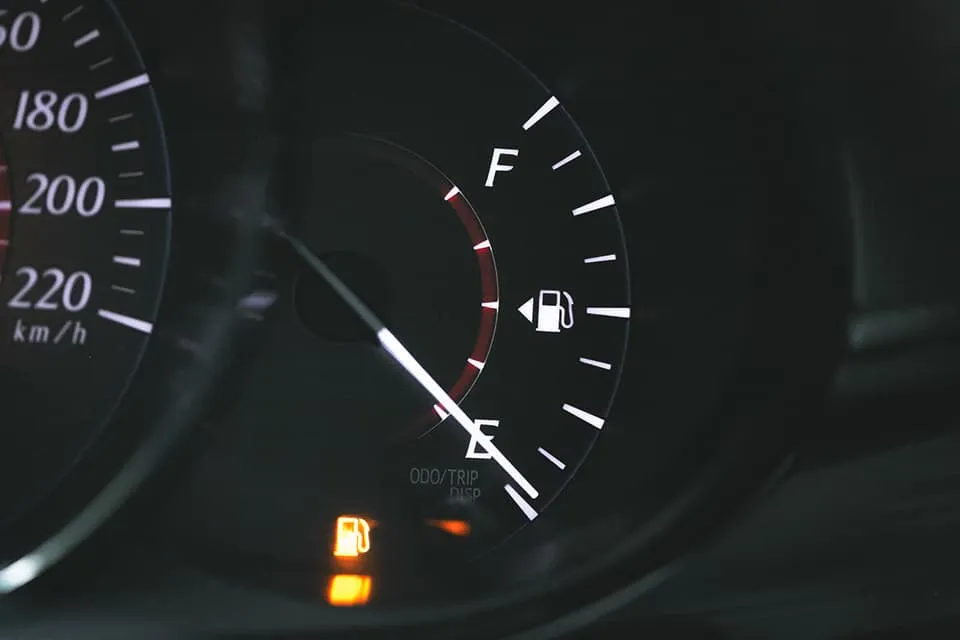MPG Meaning Explained: What Is Good Gas Mileage For Your Car?

With prices on everything rising, the average household is looking for any way they can to save money. One of the best ways to make room in your monthly budget is by getting good gas mileage. When we look at average MPG ratings, it can be challenging to know which are good and bad, especially with all the factors that affect your vehicle's fuel economy. Let's start by defining what gas mileage is, then look at what constitutes good gas mileage for your car, truck, or SUV.

What is MPG?
MPG Car Meaning: Miles per gallon, a standard measurement of your vehicle's fuel economy.
MPG stands for "Miles Per Gallon"; put simply, MPG means how many miles your car can drive for every gallon of gas it burns. The higher your vehicle's MPG, the more fuel-efficient it will be on the road. How many miles per gallon your car gets is not a static number; your MPG is affected by several factors, including:
Travel Distance: While longer distances will inevitably burn up a higher quantity of fuel, the amount of MPG you get during travel can be changed by how warm your engine is. If you frequently start your car in the cold and travel a short distance, your vehicle will be less fuel efficient than it would with an adequately warmed-up car.
Travel Speed: Fast acceleration or sustained high speeds can quickly drain your gas tank, and maintaining a travel pace over 60 mph can reduce your fuel economy significantly. At the same time, frequent stopping and starting (like you often see in city driving) can also cause a drop in fuel efficiency.
Maintenance Level: A well-maintained vehicle will perform to the best of its abilities and travel as efficiently as possible. If your car struggles due to irregular oil changes, shoddy equipment, or clogged air filters, it will likely consume more fuel just to travel at the same speeds. If there is any part of your car that you've been neglecting, you can expect poor performance coupled with lower MPG as a result.
Tire Quality: Worn-down tires that lack proper tread can cause friction issues when you travel, lowering your MPG and requiring more engine power to maintain speed. Tire pressure can also harm fuel economy; low-pressure tires will cause similar friction problems to tires with low tread, resulting in higher fuel use.
Where You Drive: Cars get vastly different MPG in the city vs the highway, with highway miles being kinder to your car's condition and overall fuel economy. This is due to the rougher roads you find in cities and the way street systems are designed. With frequent intersections, stoplights, and other traffic impediments, you'll stop and accelerate frequently enough to significantly impede your vehicle's ability to achieve good MPG.
What Type of Oil You Use: Frequent oil changes, along with certain types of oil, can increase the fuel economy of your vehicle. Lower-viscosity oil can pump more easily through your engine, decreasing resistance as it travels between its moving parts. However, regular oil maintenance is the more critical factor, as neglecting oil changes can lead to sludge and poor engine performance.
Weather Conditions: Cold weather conditions can make it harder for the internal mechanics of your vehicle to function, especially your engine. If the temperature drops low enough, your engine will struggle to propel your vehicle (especially when you first start it up.) Even if you take the time to warm up your car, that gas spent idling will lower your overall fuel efficiency. With cold weather driving challenges, achieving a good MPG can seem like an uphill battle!
Cargo: The overall weight of your vehicle can also be a determining factor in your fuel economy; your cargo primarily decides this. Cargo can be the luggage or equipment you bring with you on a trip, the passengers filling your seats, or any extra items you have strapped to the roof or rear of your vehicle. Lower weights mean better fuel economy, so consider how much weight you're holding before traveling. That extra luggage could cost you valuable miles per gallon and tack on extra costs to a trip.
What is Considered Good Gas Mileage?
If we look at the averages achieved by various vehicle types, good gas mileage would be anything over 23 miles per gallon (combined city and highway.) Of course, whether or not a vehicle has "good mileage" depends on your vehicle type and the purpose you use it for. A good MPG for a truck meant to haul supplies short distances will vastly differ from a good MPG for a passenger car on a road trip.
What is Good Gas Mileage For an SUV?
A gas-powered SUV is usually much heavier than your standard car, meaning it gets lower overall MPG ratings. For the most part, SUVs attain less than 30 miles per gallon on the highway and even less when driven in the city. For non-hybrid models, good gas mileage would be anything over 22 MPG for highway miles. Some specific models achieve better fuel economy; for example, the Toyota RAV4 Hybrid AWD gets 40 MPG. Of course, part of this model's efficiency has to do with its hybrid capabilities and smaller size.
What is Good Gas Mileage For a Truck?
Gas-powered trucks suffer the same issue as SUVs in that they are usually heavier and tend to haul larger amounts of cargo. Anything over 18 miles per gallon is considered good mileage, as that is the median fuel economy for your standard truck. Average MPGs vary depending on truck sizes: for example, 17 MPG is the average for a full-size pickup truck, and 21 MPG is the average for a midsize pickup truck.
If you are willing to go electric, many more attractive MPG options are available. Many companies are pivoting to convert their model lineups to electric. Ford's signature F-150 is one recent example, with their F-150 Lightning achieving 68 MPGe with an estimated range of 230 miles.
What is Good Gas Mileage for an EV?
Many EVs don't use gas, so gas mileage isn't applicable; there is a different metric by which their fuel efficiency is measured: MPGe. MPGe, or miles per gallon equivalent, accounts for electricity usage as a primary or secondary fuel source, and it evens out to be the same as average EV miles per charge. The Environmental Protection Agency, or EPA, determined that 33.7 kilowatt-hours of electricity is roughly the same as one gallon of fuel. So, MPGe is based on how far a vehicle can travel for every 33.7 kWh used.
MPGe numbers tend to be a lot higher than your average MPG rating. Anything over 100 MPGe is considered good, as that is roughly the average. The average you get will depend on various factors, like where you drive and the weather. For example, stop-and-go traffic or winter heat or summer AC usage will all decrease the average mile per charge a vehicle gets.
Some models can achieve much higher MPGe ratings than this, with vehicles like the 2022 Tesla Model 3 boasting 134 combined city and highway MPGe. However, there are high-end options, like the Lucid Air, that achieve almost 600 miles per charge.
Where Can I Find Cars With Good Gas Mileage?
If you want to research cars with good gas mileage, the best place to do so is GoodCar. GoodCar can provide all the available information about any car you wish to purchase, including those with high MPG ratings and above-average fuel efficiency. Not only that, but GoodCar also offers some of the highest-quality vehicle history reports available anywhere online. These reports are invaluable when searching for a new or used car and can give you important information like:
- Title Records
- Junk/Salvage Records
- Insurer "Total Loss" Records
- Pricing
- Sales History
- Problem Checks
- Auto Specs
- Location History
- NHTSA Crash Test Ratings
- NHTSA Recalls
- Awards and Accolades
- Manufacturer Information
Getting a gas-efficient car can save you hundreds, or even thousands, of dollars each year in fuel costs. If you want to lower your monthly automotive bills and save at the pump, getting a car with good gas mileage is a must. But just because a car has a high MPG rating doesn't mean it's worth the price. A vehicle history report can determine whether a seller is genuine about a car's history. You can also use the report's information to negotiate lower prices and reduce your risk of being scammed by unscrupulous sellers.
FREE Vehicle Search
- Accidents
- Problem Checks
- Title Records
- Recalls
- Values
- Specs
-
InfoPay, Inc. (dba GoodCar) is an Approved NMVTIS Data Provider
-
-































